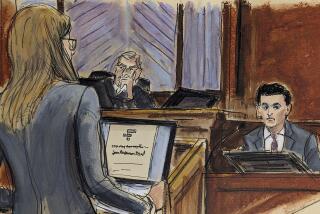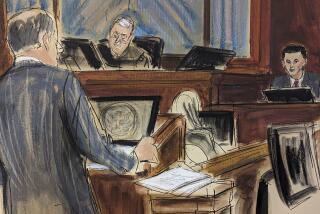Prosecutors Face Choices With Fastow
- Share via
Once a fast climber up the corporate ladder, former Enron Chief Financial Officer Andrew S. Fastow is headed for a long stretch in federal prison unless he can provide significant new evidence against his ex-bosses, Jeffrey K. Skilling and Kenneth L. Lay, legal experts said Thursday.
Fastow, 40, has not been charged, but he was portrayed as the mastermind of three allegedly fraudulent off-the-books partnerships in court papers filed Wednesday with the felony guilty pleas of Fastow subordinate Michael J. Kopper.
That means prosecutors probably have enough evidence to charge Fastow, attorneys say, and the fact that they haven’t suggests that they still are sorting out what Fastow may be able to give them at the negotiating table.
“It’s clear at this point that Mr. Fastow is in the cross hairs of the government based on the information provided by Mr. Kopper,” said Robert A. Mintz, a former U.S. prosecutor who now is a partner in New Jersey law firm McCarter & English.
The choice for prosecutors is whether to negotiate a deal with the former CFO of Enron Corp. to get to Skilling and Lay or to play tough with Fastow, who may represent their best chance for scoring a big prison sentence.
Even if Fastow is able to negotiate a plea bargain with prosecutors, as Kopper did, the exchange of cooperation for leniency probably would include some jail time, several experts said.
Kopper, 37, pleaded guilty to charges of money laundering and conspiracy to commit wire fraud and agreed to cooperate in the Enron investigation and to hand over $12 million in profits from the three partnerships, called RADR, Chewco and Southampton.
Though Fastow has not been charged, federal prosecutors said they are moving to seize property and $23.6 million in cash from him and others, including his wife and brother and several Enron employees who invested in the questionable partnerships.
It is unclear how much, if any, incriminating data prosecutors have collected on Skilling, 48, Enron’s former chief executive, and Lay, 60, its former chairman and chief executive. Neither has been implicated in the partnership schemes, and they were not mentioned in any of the publicly available documents filed in connection with Kopper’s plea agreement.
However, Skilling and Lay face possible charges of illegal insider trading if it can be proved that they sold huge chunks of Enron stock when they knew the partnerships were contributing to the deterioration of Enron’s financial condition. Skilling also could face perjury charges if his vehement and extensive denials of wrongdoing in testimony before Congress prove false.
The investigation appears to be following the trail blazed by the Powers Report, the probe conducted by independent Enron board members that explored some of the allegedly fraudulent partnerships, including Chewco and Southampton, said Dennis H. Taylor, a former Securities and Exchange Commission lawyer now with Shepherd, Smith & Bebel in Houston.
The report, issued in February, sternly criticized Lay as an absentee manager but also absolved him of wrongdoing with the partnerships, Taylor said. Skilling also failed to adequately oversee the partnerships, the report said, and was warned by former Treasurer Jeffrey McMahon about conflicts of interest in the suspect partnerships but took no action.
Some experts doubt that government prosecutors would cut a deal with Fastow given the evidence they appear to have amassed against him. Throughout their court filings, investigators portray Fastow as the puppet master of the off-the-books partnerships, listing in extensive detail the kickbacks that he allegedly received and the measures that he allegedly put in place to disguise his actions.
“He’s been vilified [in court filings] and it would be highly unlikely, both because of the position he held and what he’s alleged to have done, that they’d be interested in aggressively pursuing a deal with him,” said Walt Brown, a former prosecutor in Los Angeles who is now a partner at Gray Cary in San Francisco.
Prosecutors probably would consent to a plea bargain if Fastow agreed to a harsh penalty, experts said. But if prosecutors pressed for too long a prison term, Fastow might conclude that he has little to lose by fighting any charges in court.
Prosecutors also would have to worry about a potential public relations nightmare if it appeared that they were going lightly on someone perceived to have been a main culprit in Enron’s downfall.
“Cutting any deal is going to subject them to a fair amount of criticism,” said Dan Hedges, a former U.S. attorney in Houston now in private practice. “As a prosecutor, it would be a bad idea, and politically it would be suicide.”
Any decision allowing Fastow to plead to lesser charges could rest on whether he could provide substantial evidence implicating his former superiors, Skilling and Lay. Some experts say it would be much tougher to convict Skilling and Lay, in part because they were not involved in the day-to-day activities of the partnerships and could disclaim any knowledge of Fastow’s financing.
Cutting a deal with Fastow therefore poses a risk for prosecutors: They may not get what they need to convict Skilling or Lay, while giving up the chance to throw the book at Fastow.
Investigators are probably looking at other mid-level executives, like Kopper, who were involved or knew about the schemes and could testify, Mintz said. That way, prosecutors are not relying on a single star witness, as they did with David B. Duncan, the former Arthur Andersen auditor who played that role in Andersen’s obstruction-of-justice trial.
“We saw how well that worked,” Mintz quipped. Though the government won a conviction against Andersen, the victory did not come as easily as many had predicted, and jurors said Duncan’s testimony was not central to their decision.
More to Read
Sign up for Essential California
The most important California stories and recommendations in your inbox every morning.
You may occasionally receive promotional content from the Los Angeles Times.










